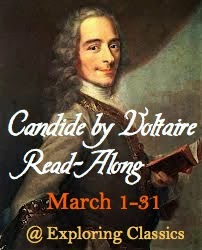Candide Readalong: I-VIII
 The Candide Readalong has begun, and I'm already kind of behind schedule. I tried to get hold of a copy that would have more helpful notes and whatnot, but my attempt failed, so I'm reading my little Dover Thrift Edition, which to my surprise actually does have some footnotes, but not many. There are maybe 15. Anyway, I read chapters I-VIII last night (except I'm posting this two days later)
The Candide Readalong has begun, and I'm already kind of behind schedule. I tried to get hold of a copy that would have more helpful notes and whatnot, but my attempt failed, so I'm reading my little Dover Thrift Edition, which to my surprise actually does have some footnotes, but not many. There are maybe 15. Anyway, I read chapters I-VIII last night (except I'm posting this two days later). They are very short, but you have to pay close attention or you'll miss something.
Candide was written as a vicious satire of the brand of philosophy that insisted that this is the best of all possible worlds, and that everything happens for a really good reason and it couldn't be better. So we are about to read a story in which Candide, an innocent young man, and his teacher Pangloss, the tutor who preaches this philosophy and insists that there is no free will but everyone makes choices, are about to spend the next 100 pages seeing horrible disasters, suffering needless torments, and generally having an awful time of it. Everyone else will suffer even more, all to prove that this world is not the best of all possible worlds. Since practically no one says that any more, it's no longer the dramatic social satire it once was, but let's read it anyway.
I don't think I will summarize the story for you, but it's only chapter 8 and Candide has been through a lot. Pangloss just got hanged, and Candide is thrilled to meet the girl he loves, who he thought was dead. Cunegonde has been having an awful time and now rejects Pangloss' philosophy.
Fariba asks some questions:
1) Do you think Pangloss is a predatory figure or merely naive like Candide? In other words, is Pangloss deliberately trying to lead others astray or does he actually believe in the philosophy of optimism?
Oh, he's a believer, I think. He's really convinced of his own philosophy, but he's also kind of an idiot. He has a great opinion of his own intelligence, and he's convinced the people around him of it (I imagine them as people who want to be more sophisticated than they are, and believe that Pangloss is this great intellectual who will teach them how to be that), but Pangloss is all about the argument and has no common sense or regard for reality. He will suffer for his philosophy, but he can't be convinced he's wrong.
2) How do you feel about Voltaire’s writing style? Do you find this book funny or disturbing?
So far more disturbing than funny. I'm not wild about scenes of mass rape and carnage (even after the action is over).
3) Who is your favorite character thus far?
The Anabaptist fellow is the only one with any sense at all, so far. And he's dead. I liked him best. Cunegonde may turn out to be a reasonable person; we don't know yet.
As a minor note, just as I was preparing to read this book, my daughter's math book had a problem that began "Candide and Pangloss walked to the scene of the disaster..." and cracked me up. Then I had to explain to the 13yo. Her math book frequently drops in weird little references or jokes like that.




The extremes between the intellectualness of Pangloss and his apparent blindness to what is around him is, for me, a little difficult to believe. I understand this book is supposed to be satire but does that mean it can't be just a little subtle? I'm having a little trouble buying into the extremes of these characters, which will affect how much I buy into Voltaire's world-view. I at least want him to have a fair chance to convince me of his arguments.
ReplyDeleteOut of curiosity, what math book does your daughter use? Is it Life of Fred?
I don't have a problem with it; some intellectual types are like that, if not to that satirical extreme.
ReplyDeleteNo, I use Saxon. I am a Saxon fan to a ridiculous extent.
Oh, funny (about the Candide word problem). I love Saxon, too.
ReplyDeleteAnd I am so glad that (Optimism) philosophy is outdated. What a silly notion.
Ha, I was going to ask what math you were using too. :) We use Saxon, and I don't remember seeing those names! Which book is it?
ReplyDeleteOn sort of a side note, I had a surprisingly hard time staying on track with the first readalong I ever tried (Eugene Onegin). I liked the book, but somehow reading and posting according to schedule was making me crazy. Do you ever find that with readalongs?
It's Algebra I. I forget which lesson--somewhere in the early 90s, about distance/rate/time problems.
ReplyDeleteI haven't had too much trouble with read a longs as far as the reading goes, but posting on time can be a problem!
The postings are certainly the hard part for me. Finding all the time to read is challenging enough and throwing in write-ups creates an even bigger challenge.
ReplyDeleteI have found that it does at least seem to keep me closer to a schedule on reading the book if I feel like I have to keep up with the read-along.
Cleopatra - Do you use Life of Fred? Mine looked at those and ran the other direction, prefers a more traditional textbook style.